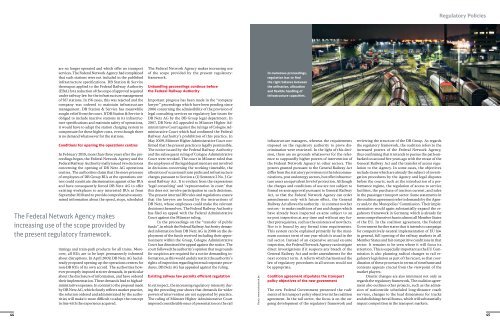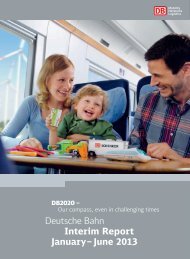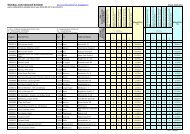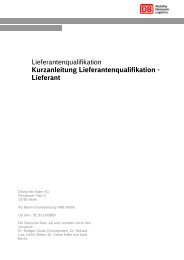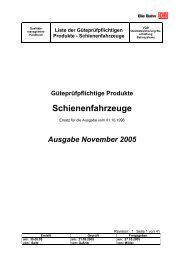Market & Competition - Deutsche Bahn AG
Market & Competition - Deutsche Bahn AG
Market & Competition - Deutsche Bahn AG
Create successful ePaper yourself
Turn your PDF publications into a flip-book with our unique Google optimized e-Paper software.
are no longer operated and which offer no transport<br />
services. The Federal Network Agency had complained<br />
that such stations were not included in the published<br />
infrastructure specifications. DB Station & Service<br />
thereupon applied to the Federal Railway Authority<br />
(EBA) for a reduction of the scope of approval required<br />
under railway law for the infrastructure management<br />
of 567 stations. In 156 cases, this was rejected and the<br />
company was ordered to maintain infrastructure<br />
management. DB Station & Service has meanwhile<br />
sought relief from the court. If DB Station & Service is<br />
obliged to include inactive stations in its infrastructure<br />
specifications and maintain safety of operations,<br />
it would have to adapt the station charging system to<br />
compensate for these higher costs, even though there<br />
is no demand whatsoever for the stations.<br />
Conditions for opening the operations centres<br />
In February 2010, more than three years after the proceedings<br />
began, the Federal Network Agency and the<br />
Federal Railway Authority inally issued two decisions<br />
concerning the opening of DB Netz <strong>AG</strong> operations<br />
centres. The authorities claim that the mere presence<br />
of employees of DB Group RUs at the operations centres<br />
could constitute discrimination against other RUs<br />
and have consequently forced DB Netz <strong>AG</strong> to offer<br />
existing workplaces to any interested RUs as from<br />
September 2010 and to provide comprehensive anonymised<br />
information about the speed, stops, scheduled<br />
The Federal Network Agency makes<br />
increasing use of the scope provided by<br />
the present regulatory framework.<br />
timings and train-path products for all trains. Moreover,<br />
all RUs are to be kept permanently informed<br />
about disruptions. In April 2009, DB Netz <strong>AG</strong> had already<br />
proposed opening up the operations centres for<br />
non-DB RUs of its own accord. The authorities however<br />
promptly imposed stricter demands, in particular<br />
about the disclosure of information, and have ordered<br />
their implementation. These demands lead to high administrative<br />
expenses. In contrast to the proposal made<br />
by DB Netz <strong>AG</strong>, which closely reflects market prac tice,<br />
the solution ordered and administrated by the authorities<br />
will make it more difficult to adapt the concept<br />
in line with the experience acquired.<br />
The Federal Network Agency makes increasing use<br />
of the scope provided by the present regulatoryframework.<br />
Unbundling proceedings continue before<br />
the Federal Railway Authority<br />
Important progress has been made in the “company<br />
lawyer” proceedings which have been pending since<br />
2006 concerning the admissibility of the provision of<br />
legal consulting services on regulatory law issues for<br />
DB Netz <strong>AG</strong> by the DB Group legal department. In<br />
2007, DB Netz <strong>AG</strong> appealed to Münster Higher Administrative<br />
Court against the rulings of Cologne Administrative<br />
Court which had confirmed the Federal<br />
Railway Authority’s prohibition of this practice. In<br />
May 2009, Münster Higher Administrative Court confirmed<br />
that the present practice is legally permissible.<br />
The notice issued by the Federal Railway Authority<br />
and the subsequent ruling of Cologne Administrative<br />
Court were revoked. The court in Münster ruled that<br />
the employees of the legal department are not involved<br />
in decisions concerning the working timetable, the<br />
allocation of occasional train paths and infrastructure<br />
charges pursuant to Section a (1) Sentence 2 No. 3 General<br />
Railway Act. It is evident from the expressions<br />
‘legal consulting’ and ‘representation in court’ that<br />
this does not involve participation in such decisions.<br />
The present internal DB rules and regulations ensure<br />
that the lawyers are bound by the instructions of<br />
DB Netz, whose employees could make the relevant<br />
decisions themselves. The Federal Railway Authority<br />
has filed an appeal with the Federal Administrative<br />
Court against the Münster ruling.<br />
In the proceedings on the “transfer of public<br />
funds”, in which the Federal Railway Authority demanded<br />
information from DB Netz <strong>AG</strong> in 2008 on the deployment<br />
of the funds received including their apportionment<br />
within the Group, Cologne Administrative<br />
Court has dismissed the appeal against the notice. The<br />
court followed the authority’s opinion that no grounds<br />
for suspicion are required for a notice demanding information,<br />
as this would unduly restrict the authority’s<br />
rights of inspection regarding internal corporate procedures.<br />
DB Netz <strong>AG</strong> has appealed against the ruling.<br />
Existing railway law permits efficient regulation<br />
In retrospect, the increasing regulatory intensity during<br />
the preceding year shows that demands for wider<br />
powers of intervention are not supported by practice.<br />
The ruling of Münster Higher Administrative Court<br />
imposed considerable onus of presentation on the rail<br />
In numerous proceedings,<br />
regulation has to find<br />
the right balance between<br />
the utilisation, allocation<br />
and flexible handling of<br />
infrastructure capacities.<br />
infrastructure managers, whereas the requirements<br />
imposed on the regulatory authority to prove discrimination<br />
were restricted. In the light of this decision,<br />
there are no grounds whatsoever for the reference<br />
to supposedly higher powers of intervention of<br />
the Federal Network Agency in other sectors. The<br />
powers granted pursuant to the General Railway Act<br />
differ from the statutory provisions in the telecommunications,<br />
post and energy sectors, but offer infrastructure<br />
users an equivalent level of protection. Although<br />
the charges and conditions of use are not subject to<br />
formal ex-ante approval pursuant to General Railway<br />
Act, so that the Federal Network Agency can order<br />
amendments only with future effect, the General<br />
Railway Act allows the authority – in contrast to other<br />
sectors – to make conditions of use and charges which<br />
have already been inspected ex-ante subject to an<br />
ex-post inspection at any time and without any further<br />
prerequisites, such as the existence of new facts.<br />
Nor is it bound by any formal time requirements.<br />
This system can be explained primarily by the maximum<br />
contract term of one year which is usual in the<br />
rail sector. Instead of an expensive annual ex-ante<br />
inspection, the Federal Network Agency can instigate<br />
direct investigations if it suspects any breach of the<br />
General Railway Act and order amendments for the<br />
next contract term. A reform which harmonised the<br />
law of regulatory procedures in all sectors would not<br />
be appropriate.<br />
Coalition agreement stipulates the transport<br />
policy objectives of the new government<br />
The new Federal Government presented the rudiments<br />
of its transport policy objectives in the coalition<br />
agreement. In the rail sector, the focus is on the ongoing<br />
development of the regulatory framework and<br />
reviewing the structure of the DB Group. As regards<br />
the regulatory framework, the coalition refers to the<br />
increased powers of the Federal Network Agency,<br />
thus confirming that it intends to pursue the path embarked<br />
on around five years ago with the recast of the<br />
General Railway Act and the transfer of access regulation<br />
to the Agency. In some cases, the objectives<br />
include items which are already the subject of investigation<br />
procedures by the Agency and legal disputes<br />
before the courts, such as the introduction of a performance<br />
regime, the regulation of access to service<br />
facilities, the purchase of traction current, and sales<br />
in the passenger transport sector. Some statements in<br />
the coalition agreement refer to demands by the Agency<br />
and/or the Monopolies’ Commission. Their implementation<br />
would again substantially expand the regulatory<br />
framework in Germany, which is already far<br />
more comprehensive than in almost all Member States<br />
of the EU. In the coalition agreement, the Federal<br />
Government further states that it intends to campaign<br />
for competitively-neutral implementation of EU law<br />
in general, full opening of the railway markets in all<br />
Member States and fair competitive conditions in that<br />
sector. It remains to be seen where it will focus its<br />
attention. This is especially important as the EU Commission<br />
is also planning radical changes to rail regulatory<br />
legislation as part of the recast, so that coordination<br />
of these processes in terms of timeframe and<br />
contents appears crucial from the viewpoint of the<br />
market players.<br />
Drastic changes are also imminent not only as<br />
regards the regulatory framework. The coalition agreement<br />
also outlines other projects, such as the admission<br />
of nationwide scheduled long-distance coach<br />
services, changes to the load dimensions for trucks<br />
and abolishing the rail bonus, which will substantially<br />
impact competition in the transport markets.<br />
Regulatory Policies<br />
44 45<br />
Photo: www.stefanbock.de


